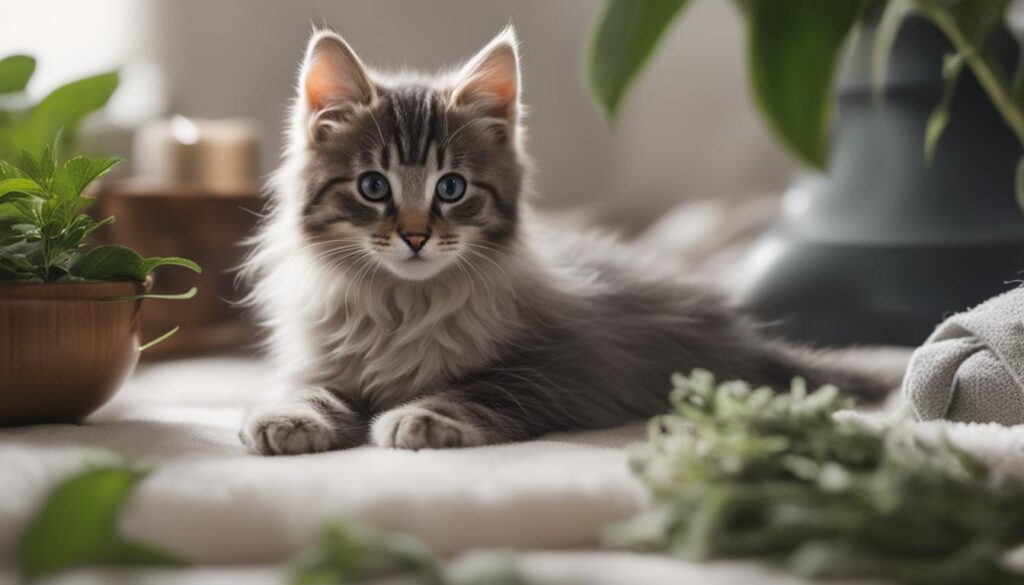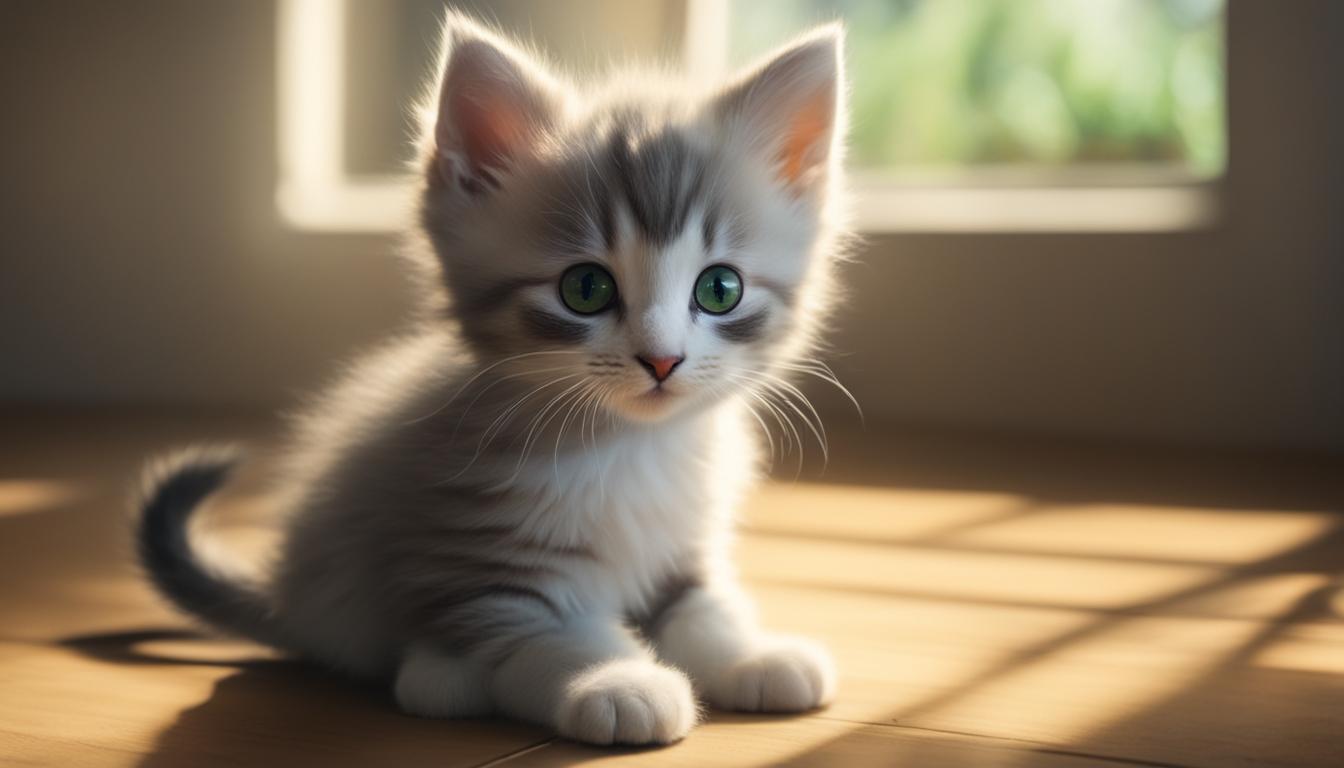If you’ve noticed your kitten sneezing, you may be wondering what could be causing it and how to help them. Sneezing in kittens can be a result of various factors, including respiratory infections, allergens, dental issues, and more. In this article, we will explore the common causes of kitten sneezing and discuss the treatment options available.
It’s important to understand that sneezing in kittens can be a sign of an underlying health issue, so it’s crucial to monitor their symptoms and seek veterinary care when necessary. By addressing the cause of their sneezing, you can help your kitten feel better and ensure their overall well-being.
- Symptoms of Respiratory Infections in Kittens
- Common Causes of Sneezing in Kittens
- When to Worry About Kitten Sneezing
- Treatment for Sneezing Kittens
- Inhaled Irritants and Allergens: Common Contributors to Kitten Sneezing
- Home Care for Sneezing Cats
- Cost of Treating Respiratory Infections in Kittens
- Conclusion
- FAQ
- Source Links
Key Takeaways:
- Sneezing in kittens can be caused by respiratory infections, allergens, dental issues, and more.
- Common symptoms of respiratory infections in kittens include sneezing, coughing, runny eyes, and nasal discharge.
- Identifying the underlying cause is important for appropriate treatment.
- Supportive care, medication, and proper nutrition can help alleviate sneezing and promote recovery.
- Monitoring your kitten’s symptoms and seeking veterinary care when necessary is crucial for accurate diagnosis and treatment.
Symptoms of Respiratory Infections in Kittens
Kittens are prone to respiratory infections, and it is important for pet owners to be aware of the common symptoms that may indicate an underlying issue. Recognizing these signs early on can help in prompt diagnosis and treatment. Here are some common symptoms of respiratory infections in kittens:
- Sneezing: If your kitten is sneezing frequently or uncontrollably, it could be a sign of a respiratory infection.
- Coughing: Persistent coughing can also be indicative of a respiratory issue in kittens.
- Runny eyes: Watery or discharge-filled eyes can be a symptom of an upper respiratory infection.
- Nasal discharge: If your kitten has a runny or stuffy nose, it may be a sign of a respiratory infection.
- Wheezing: A wheezing sound during breathing is a cause for concern and should be evaluated by a veterinarian.
- Decreased appetite: Respiratory infections can cause kittens to lose their appetite or have difficulty eating.
- Lethargy: If your kitten seems unusually tired or inactive, it could be a sign of an underlying health issue.
- Difficulty breathing: Labored breathing or shortness of breath is a serious symptom that should be addressed immediately.
- Enlarged lymph nodes: Swollen lymph nodes around the neck or jaw area may indicate an infection.
If your kitten is exhibiting any of these symptoms, it is important to consult a veterinarian for a proper diagnosis and treatment plan. Early intervention can help prevent complications and ensure your kitten recovers quickly.
Common Causes of Sneezing in Kittens
Sneezing in kittens can be caused by various factors. Understanding the common causes of sneezing is crucial for identifying the underlying issue and providing appropriate treatment. Here are some of the most common reasons for kitten sneezing:
- Upper respiratory infection (URI): URI is highly contagious, especially in recently adopted kittens from shelters. It is caused by viral or bacterial infections and can result in sneezing, coughing, and nasal discharge.
- Viral infections: Viruses like feline herpesvirus (FHV) and feline calicivirus (FCV) are common causes of respiratory issues in kittens. These infections can lead to sneezing, runny eyes, and other cold-like symptoms.
- Inhaled irritants and allergens: Household cleaning products, cigarette smoke, pollen, and other environmental irritants can trigger sneezing in kittens with sensitivities or allergies.
- Dental disease: Dental problems, such as tooth abscesses or gum infections, can cause nasal irritation and result in sneezing.
- Foreign material lodged in the nose: Kittens are curious explorers, and sometimes they can get small objects stuck in their noses, leading to sneezing.
Identifying the specific cause of sneezing in kittens is essential for appropriate treatment. If your kitten is experiencing frequent or persistent sneezing, it is recommended to consult a veterinarian for a thorough examination and accurate diagnosis.
Table: Common Causes of Sneezing in Kittens
| Cause | Description |
|---|---|
| Upper respiratory infection (URI) | Highly contagious viral or bacterial infections that result in sneezing, coughing, and nasal discharge. |
| Viral infections | Feline herpesvirus (FHV) and feline calicivirus (FCV) can lead to sneezing and other cold-like symptoms. |
| Inhaled irritants and allergens | Household cleaning products, cigarette smoke, pollen, and other environmental irritants can trigger sneezing in sensitive kittens. |
| Dental disease | Tooth abscesses or gum infections can cause nasal irritation and result in sneezing. |
| Foreign material lodged in the nose | Kittens may accidentally inhale small objects that get stuck in their noses, leading to sneezing. |

“Understanding the common causes of sneezing is crucial for identifying the underlying issue and providing appropriate treatment.”
When to Worry About Kitten Sneezing
If your kitten sneezes occasionally with no other symptoms or only mild symptoms, there is usually no cause for immediate concern. Sneezing can be a normal and healthy way for cats to clear their nasal passages. However, if the sneezing persists, is accompanied by other cold-like symptoms such as decreased activity, nasal or eye discharge, loss of appetite, or the presence of blood or mucus in the nose, it is recommended to consult a vet for accurate diagnosis and treatment.
Sneezing, especially if severe and persistent, can indicate an underlying respiratory infection or other health issue that may need attention. Some respiratory infections, such as feline herpesvirus or feline calicivirus, can be highly contagious and may require specific treatments. It is important to address these infections promptly to prevent further complications and discomfort for your kitten.
Remember, as a responsible pet owner, you are the best judge of your kitten’s behavior and health. If you notice any changes or abnormalities, it’s always better to err on the side of caution and seek professional guidance from a veterinarian. They can provide the necessary expertise and recommendations to ensure your kitten receives the appropriate care and treatment.

Common Symptoms to Watch For:
- Sneezing accompanied by nasal or eye discharge
- Loss of appetite
- Decreased activity or lethargy
- Blood or mucus in the nose
Seeking veterinary advice is crucial when your kitten’s sneezing is persistent or accompanied by other concerning symptoms. Early intervention can help identify and address any underlying health issues, ensuring the well-being of your furry friend.
Table: When to Seek Veterinary Care for Kitten Sneezing
| Symptoms | When to Seek Veterinary Care |
|---|---|
| Frequent or persistent sneezing | If sneezing lasts for more than a few days or occurs frequently throughout the day |
| Nasal or eye discharge | If discharge is thick, colored, or has a foul odor |
| Loss of appetite | If your kitten refuses to eat or shows a significant decrease in food intake |
| Difficulty breathing | If your kitten struggles to breathe or exhibits rapid or labored breathing |
| Presence of blood or mucus in the nose | If you notice blood or mucus in your kitten’s nasal discharge |
It’s important to remember that each kitten is unique, and what may be concerning for one may not be for another. Trust your instincts and consult a veterinarian whenever you have doubts or concerns about your kitten’s health. Early intervention and appropriate treatment can help your furry companion recover quickly and thrive.
Treatment for Sneezing Kittens
If your kitten is experiencing sneezing episodes, it’s important to identify and address the underlying cause. The appropriate treatment for sneezing kittens depends on the specific cause, ranging from mild cases that can be managed at home to more severe infections that require medical intervention.
In mild cases of upper respiratory infections, providing supportive care at home can help alleviate symptoms. This includes monitoring your kitten’s appetite, ensuring they are well-hydrated, using a humidifier to moisten the air, and gently wiping their nose and eyes with warm compresses. These measures can help ease congestion and promote healing.
However, if the sneezing persists or is accompanied by other concerning symptoms, it is crucial to consult a veterinarian for accurate diagnosis and targeted treatment. Depending on the underlying cause, your vet may prescribe antibiotics to combat bacterial infections, antihistamines to relieve allergies, or steroids to reduce inflammation. In more severe cases, hospitalization and additional interventions may be required.
Treatment Options for Sneezing Kittens:
- Supportive care at home, including monitoring appetite and providing fluids
- Use of a humidifier to moisten the air and ease congestion
- Gentle wiping of the nose and eyes with warm compresses
- Antibiotics to combat bacterial infections
- Antihistamines to relieve allergies
- Steroids to reduce inflammation
It is crucial to follow your veterinarian’s guidance in terms of medication dosage and administration. Additionally, completing the full course of prescribed medication is essential to ensure the infection is completely eradicated and to prevent recurrence.
Remember, every kitten is unique, and treatment plans may vary depending on the specific circumstances. It is always best to consult a veterinarian for professional advice and recommendations tailored to your kitten’s individual needs.
Inhaled Irritants and Allergens: Common Contributors to Kitten Sneezing

When your kitten is constantly sneezing, it’s important to consider the role of inhaled irritants and allergens. These substances can trigger nasal irritation or allergic reactions, leading to sneezing episodes in kittens. By identifying and minimizing exposure to these substances, you can help reduce your kitten’s sneezing and improve their overall respiratory health.
Common Inhaled Irritants and Allergens
There are several common substances that can contribute to sneezing in kittens. These include:
- Pest sprays and insecticides
- Perfumes and strong-smelling chemicals
- Cleaning agents and disinfectants
- Cigarette smoke
- Pollen and outdoor allergens
- Dust and dust mites
- Candles and air fresheners
- Mold and mildew
Kittens with environmental allergies may also develop itchy skin lesions or feline asthma, which can be triggered by these allergens. By minimizing exposure to these irritants and allergens, you can help alleviate your kitten’s sneezing and improve their overall respiratory comfort.
Home Care for Sneezing Cats
If your cat is sneezing, there are several simple steps you can take at home to help alleviate their symptoms and provide them with comfort. Remember, while these home care suggestions can be helpful, it is always important to consult with a veterinarian for proper diagnosis and treatment.
Hydration and Nutrition
Ensure that your cat is well hydrated by providing fresh, clean water at all times. You can also consider adding wet food to their diet to help increase their overall fluid intake. If your cat’s appetite is reduced due to sneezing, try offering them smaller, more frequent meals to encourage eating.
Airway Support
Using a nebulizer or steam inhalation can help open up your cat’s airways and alleviate congestion. Fill a bathroom with steam by running a hot shower and place your cat in the room for 10-15 minutes, ensuring they are safe and comfortable. Alternatively, you can use a nebulizer specifically designed for pets, following the manufacturer’s instructions.

Comfort and Cleaning
Gently wipe your cat’s nose and eyes with warm compresses to help remove any discharge and keep them clean. Use a soft, damp cloth or cotton pad and be gentle to avoid causing any discomfort. Additionally, make sure your cat has a comfortable and clean environment, free from dust, allergens, and irritants that may worsen their symptoms.
| Home Care Tips for Sneezing Cats |
|---|
| Ensure your cat has access to fresh water at all times |
| Add wet food to their diet to increase fluid intake |
| Use steam inhalation or a nebulizer to help open their airways |
| Gently clean your cat’s nose and eyes with warm compresses |
| Provide a comfortable and clean environment, free from dust and allergens |
Remember, while these home care tips can help ease your cat’s discomfort, they are not a substitute for professional veterinary care. If your cat’s symptoms persist or worsen, or if you notice any concerning signs, such as difficulty breathing or loss of appetite, it is crucial to seek veterinary guidance for an accurate diagnosis and appropriate treatment.
Cost of Treating Respiratory Infections in Kittens
When it comes to treating respiratory infections in kittens, the cost can vary depending on the severity of the infection and the required treatments. While mild cases may only require a basic examination and medication, more complex cases can necessitate hospitalization or prolonged medication, resulting in higher expenses.
To give you a general idea, the cost of treating respiratory infections in kittens can range from around $100 to over $500. However, it’s important to note that these figures are approximate and can vary based on factors such as the location of the veterinary clinic, the specific treatments needed, and any additional tests or procedures required.
It’s worth considering pet insurance as a potential solution to help manage the costs of treating respiratory infections in kittens. Pet insurance can provide financial assistance in covering veterinary bills, reducing the financial burden and ensuring that your kitten receives the necessary care without you having to bear the full cost. Be sure to research different pet insurance providers and policies to find one that best suits your needs and budget.
| Treatment | Estimated Cost |
|---|---|
| Basic examination and medication | $100 – $200 |
| Antibiotics | $50 – $100 |
| Hospitalization | $200 – $400 per day |
| Additional tests or procedures | Varies depending on the specific treatment |
Remember, the cost of treatment should not be the sole determining factor when it comes to your kitten’s health. It’s always recommended to consult with a veterinarian to accurately diagnose and treat respiratory infections in kittens, ensuring their well-being and a swift recovery.
Conclusion
In conclusion, sneezing in kittens can be caused by various factors, including respiratory infections, inhaled irritants, allergens, dental disease, foreign material in the nose, and in rare cases, neoplasia. It is important to monitor your kitten’s symptoms and seek veterinary care when necessary to ensure accurate diagnosis and appropriate treatment.
Supportive care, medication, and proper nutrition can help alleviate symptoms and promote recovery in sneezing kittens. Remember to provide fluids, monitor appetite, use a humidifier, and gently wipe the nose and eyes. However, it is crucial to consult a veterinarian for proper diagnosis and treatment.
If you are concerned about the cost of treating respiratory infections in kittens, it is worth considering pet insurance. This can help lower veterinary bills and provide financial protection for your kitten’s healthcare needs. Remember to research and choose a suitable insurance plan that covers respiratory infections.
In summary, being vigilant about your kitten’s health, practicing proper care at home, and seeking professional veterinary advice when needed can help address and manage sneezing in kittens. By following these key takeaways, you can ensure the well-being of your furry friend and provide them with the best possible care.
FAQ
Why is my kitten sneezing?
Sneezing in kittens can be caused by various factors, including upper respiratory infections, inhaled irritants and allergens, dental disease, foreign material in the nose, and in rare cases, neoplasia.
What are the symptoms of respiratory infections in kittens?
Common symptoms of respiratory infections in kittens include sneezing, coughing, runny eyes, nasal discharge, wheezing, decreased appetite, drooling, lethargy, difficulty breathing, and enlarged lymph nodes.
What are the common causes of sneezing in kittens?
Common causes of sneezing in kittens include upper respiratory infections, viral infections like feline herpesvirus and feline calicivirus, bacterial infections, fungal infections like Cryptococcus, inhaled irritants and allergens, dental disease, foreign material in the nose, and in rare cases, neoplasia.
When should I worry about my kitten sneezing?
You should worry about your kitten sneezing if the sneezing persists, is accompanied by other cold-like symptoms such as decreased activity, nasal or eye discharge, loss of appetite, or the presence of blood or mucus in the nose.
How are sneezing kittens treated?
Treatment for sneezing kittens depends on the underlying cause. Mild cases of upper respiratory infections may resolve on their own with supportive care, while more severe cases may require antibiotics, antihistamines, steroids, and fluids. Surgery or hospitalization may be necessary in rare cases.
How do environmental factors contribute to kitten sneezing?
Inhaled irritants and allergens such as pest sprays, perfumes, cleaning agents, cat litter, cigarette smoke, pollen, dust, candles, and mold can contribute to kitten sneezing. Cats with environmental allergies may also develop itchy skin lesions or feline asthma triggered by allergens.
How can I help my sneezing cat at home?
Supporting a sneezing cat at home includes ensuring they are not dehydrated, monitoring their appetite and providing appropriate nutrition, using a nebulizer or steam inhalation to help open the airways, and gently wiping the nose and eyes with warm compresses.
How much does it cost to treat respiratory infections in kittens?
The cost of treating respiratory infections in kittens can vary depending on the severity of the infection and the required treatments. Expenses can range from $100 for basic examination and medication to over $500 for more complex cases that require hospitalization or prolonged medication.
What are the key takeaways about sneezing in kittens?
Sneezing in kittens can be a sign of respiratory infections or other underlying health issues. It is important to have your kitten examined by a vet to accurately diagnose and treat the cause of the sneezing. Supportive care at home and proper veterinary treatment can help alleviate symptoms and promote recovery.




